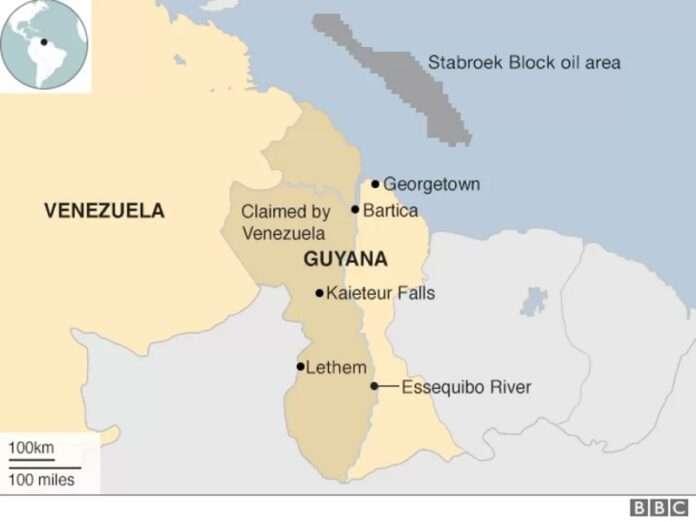The nearly two-century-long dispute over Essequibo is back in the headlines after Venezuela’s referendum on this mostly forested and potentially mineral-rich region, which Caracas claims as its own but is currently administered by Guyana. Without diving too deeply into the history, an 1899 ruling awarded almost all of it to then-British Guiana, but Venezuela objected to the outcome and once again officially raised its claims after World War II, which resulted in the 1966 Geneva Agreement.
The purpose of this piece isn’t to argue the legality of each country’s claims but to point out how this dispute has turned into a classic security dilemma. The issue began to re-emerge in the middle of the last decade after Exxon began prospecting for oil off of Essequibo’s coast and ultimately found enormous deposits there. In fact, they’re so large that Guyana is expected to soon have one of world’s highest oil earnings per capita, with estimates exceeding those of some Gulf Kingdoms and Norway.
The amount of investment that’s since flooded into this country of a little more than 800,000 people resulted in the fastest economic growth in the world this year at a whopping 38% according to the IMF. Although most of this is obviously driven by Exxon, so much so that The Intercept reported in June that this company “captured [Guyana] without firing a shot”, Newsweek raised awareness in early November of China’s impressive economic inroads there that turned Guyana into its largest CARICOM trade partner.
The Guyanese government therefore appears to be attempting a balancing act whereby it’s subordinated the country’s energy security to the US, which has the military means to defend these oil deposits in disputed waters, while relying on China for real-sector economic investments. To be sure, Guyana is much closer to the US than to China and its oil wealth has yet to “trickle down” to its people (nor might it ever if it remains “captured” by Exxon), but it’s still not (yet?) entirely subordinating itself to the US.
From Venezuela’s perspective, however, Guyana’s pro-US disposition entails latent national security risks since Exxon’s offshore oil investments in disputed waters could serve as the pretext for inviting a permanent American military presence that could lead to a multitude of hybrid threats in the future. Caracas was thus placed into a dilemma wherein it could either let this seemingly inevitable process unfold unimpeded or try to preemptively thwart it (or at least raise the costs for Exxon and/or the US).
These developments set the backdrop for Venezuela’s referendum on this disputed region, which also came amidst the easing of US sanctions against Caracas and the winding down of the Ukrainian Conflict, the latter largely due to the West’s depleted stockpiles and the failure of summer’s counteroffensive. These last-mentioned factors arguably played the greatest role in the timing behind that decision as will now be explained.
Venezuelan policymakers apparently calculated that the US has a greater need at present for their country’s oil exports ahead of next year’s election and as suspicions circulate about de facto jointly led Russian-Saudi OPEC+’s strategic intentions than for oil exports from Guyana a few years down the road. These observations were predicated on the US’ easing of oil sanctions against their country despite it not having made any significant concessions in exchange (at least as far as the public is aware).
With them in mind, these same policymakers then took note of how much the US’ stockpiles have been depleted over the past 22 months of proxy war against Russia, which led them to conclude that it’s comparatively weaker than at any time in recent memory. Accordingly, they seem to have wagered that Venezuela’s role in ensuring the US’ immediate energy security interests and that country’s newfound military limitations created the best opportunity yet for them to press their claims to Essequibo.
The reason why they didn’t want to leave the conflict frozen was because they concluded that the US would inevitably exploit Exxon’s offshore oil investments in disputed waters as the pretext for deploying a permanent military presence that could then lead to a multitude of hybrid threats to Venezuela. It wasn’t until after the US eased the sanctions and its military limitations were exposed that policymakers realized that they had the unique opportunity to finally resolve the security dilemma over Essequibo.
Therein lies the crux of the problem, however, namely that a security dilemma does indeed exist over this issue with all the associated strategic risks. To remind readers about this concept from International Relations theory, it posits that one country’s peacefully intended moves could be perceived threateningly by another, which prompts the second to react defensively in ways that the other then misperceives as offensive. They in turn react the same way, have their intentions misperceived, and so on and so forth.
This escalation cycle then continues indefinitely until the involved parties either agree on a series of compromises for defusing their mutual tensions or they spiral out of control into conflict. There’s also the chance that one of the countries could invite a third to bolster their defensive capabilities, which could worsen the other’s threat perception and possibly lead to them countenancing preemptive action. It’s these aforementioned dynamics that are shaping the Venezuelan-Guyanese dispute over Essequibo.
Guyana wants to develop its enormous offshore oil deposits in disputed waters, which requires having a reliable partner that can defend them from Venezuelan claims, while Venezuela fears that Guyana’s chosen US partner intends to exploit this pretext to unleash myriad hybrid threats against it. Venezuela saw what its policymakers regarded as a unique opportunity to finally resolve the security dilemma over Essequibo once and for all upon calculating that energy and military factors would deter US intervention.
Without intending to, however, their referendum and related moves served to create the “publicly plausible” pretext for accelerating the US’ speculatively preplanned comprehensive military partnership with Guyana. Venezuelan policymakers’ calculations were rational, and their country has the right to preemptively thwart impending threats of the sort that they were convinced would inevitably emerge, but they overlooked the US’ electoral context and its sensitivity towards global perceptions of weakness.
Biden will face a tough challenge from the Republicans next year, who present themselves as more serious about national security than the Democrats, so the incumbent ruling party can’t afford to look weak at home by sitting aside in the scenario that Venezuela asserts control over Essequibo. Likewise, the global perception of US weakness caused by the failure of its proxy war on Russia through Ukraine puts pressure on that country to prevent a replication of that geopolitical disaster in its own hemisphere.
These additional factors raise the costs of any potential Venezuelan military intervention into Essequibo, though it should also be said that Venezuela might hope that it too can raise the costs of any potential US one or at least of Exxon’s operations, thus freezing the conflict at its most tense phase thus far. To elaborate, these same additional factors also make the US much more sensitive to large-scale and/or symbolic military losses of the kind that Venezuela might inflict on its regional naval assets in a conflict.
The sinking of a single ship, even if only by a so-called “lucky strike”, could be enough to doom the Democrats’ hopes in November. Moreover, the US public might not support an overwhelming military response against Venezuela in defense of another faraway country’s disputed border if they deem it to have the credible risk of escalating into a larger and possibly even wider war. That’s not even to mention that the Pentagon might prefer saving the rest of its reserves for any contingencies with China in Asia.
Whatever ends up happening, it’ll be the result of the complex interplay between the primary Venezuelan-Guyanese participants in this security dilemma and the latter’s US military partner, all of which have their own interests and perceptions that are shaping their respective policies. The best-case scenario is that the conflict once again soon freezes, the worst-case one is that it leads to a direct Venezuelan-US war, while the most likely scenario might be renewed US subversion of Venezuela.






